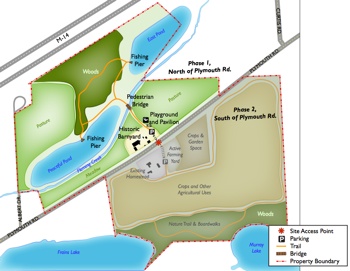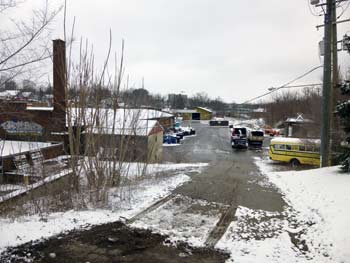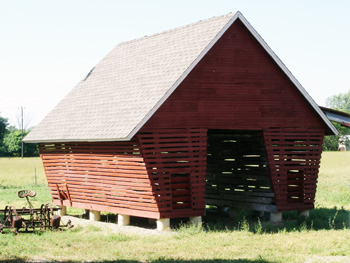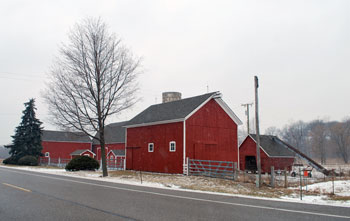County Parks Commission Gives Trail Grants
Washtenaw County parks & recreation commission meeting (March 11, 2014): Commissioners approved an application for state funds to develop a major new recreation area just northeast of Ann Arbor. They also awarded $600,000 in grants for trail projects throughout the county.
Commissioners approved an application to the Michigan Dept. of Natural Resources trust fund for a grant to help develop Staebler Farm for recreational use. WCPARC has owned the 98-acre property in Superior Township since 2001, and Donald Staebler – who is 103 years old – still lives there in a lifetime agreement with WCPARC. The plan calls for adding fishing piers to the property’s two ponds, as well as putting in a trail system and other features. A second phase might involve developing a farm incubator program.
Commissioners also awarded $600,000 in grants through WCPARC’s Connecting Communities program, which supports trail projects throughout the county. Grants were given to projects in Ann Arbor Township, Northfield Township, Pittsfield Township, and the village of Manchester.
In non-voting business, WCPARC director Bob Tetens gave an update on the east county recreation center, a proposed partnership between the city of Ypsilanti and WCPARC in which the city would supply the property and WCPARC would provide the building. The center would be located on part of the 38-acre Water Street redevelopment area. Tetens said they’ve been working with the city of Ypsilanti on a development agreement.
Ypsilanti mayor Paul Schreiber and city councilmember Pete Murdock both spoke to the commission about Water Street during public commentary. Schreiber told commissioners that he wasn’t aware of any “show-stopping” issues. He also gave an update on Water Street Flats, an apartment project that’s planned for the site. The complex would be rental apartments for residents with between 50-90% of area median income.
In other action, commissioners approved about $500,000 for repairs at the Rolling Hills water park, and were briefed on several financial reports and project updates.
An issue that had been raised during public commentary at the Feb. 11, 2014 meeting emerged again on March 11: How should deer overpopulation be managed? Two residents – Maurita Holland and Barb Lucas – urged commissioners to play a role in dealing with the issue, which is affecting WCPARC parks and preserves. “We know there’s a lot of political fallout and a lot of education that needs to be done,” Holland said. She reported that a new group has formed – Washtenaw County for Ecological Balance. Members of WCEB include Larry Kestenbaum, Washtenaw County’s clerk/register of deeds, and Chris Graham, who serves on Ann Arbor’s environmental commission.
Commissioners discussed the issue at length. Jan Anschuetz advocated for a cautious approach, noting that it’s a complex problem that needs to be addressed by multiple entities, not just WCPARC. She also expressed concern that action by WCPARC could affect the 10-year renewal of the operations millage that WCPARC expects to be put on the November 2014 ballot. “If we do something that displeases our public, we will not have a millage and will not have a parks commission and we will not have a preserve,” she said.
Janis Bobrin noted that in this community, “If we start talking about killing anything, there are people who will just not hear anything after that.” There’s the actual management of the problem, she said, but also a major education piece that’s needed. “How do we begin to get a dialogue that isn’t one camp against another? That would seem to be a productive first step.”
Tetens told commissioners that WCPARC has applied for a $29,960 grant through the Michigan Dept. of Natural Resources wildlife habitat grant program. Those funds would allow WCPARC to quantify the deer impact on county parks and preserves more precisely. Everyone agrees that the growing deer population is a problem, Tetens said, but “nobody can solve it on their own.”
Commissioners also authorized Tetens to draft a letter opposing a proposed sand and gravel mine that McCoig Materials wants to start in Lyndon Township, on 189 acres north of Chelsea on M-52. The rural site is located near several parks and nature areas, including Waterloo State Recreation Area, the Pinckney State Recreation Area, Park Lyndon, the Green Lake Camping area, and the Waterloo-Pinckney Hiking Trail. WCPARC has been interested in buying the property for at least two decades, and is hoping to work with the current landowner to add the site to the county’s nature preserves, rather than being mined.
The March 11 meeting began with a moment of silence for Fred Veigel, a long-time parks & recreation commissioner who represented the road commission on WCPARC. He died on March 2. Commissioners also passed a resolution of appreciation for his work. A replacement to WCPARC will be appointed from one of the current three road commissioners: Barb Fuller, Doug Fuller or Bill McFarlane. [Full Story]







